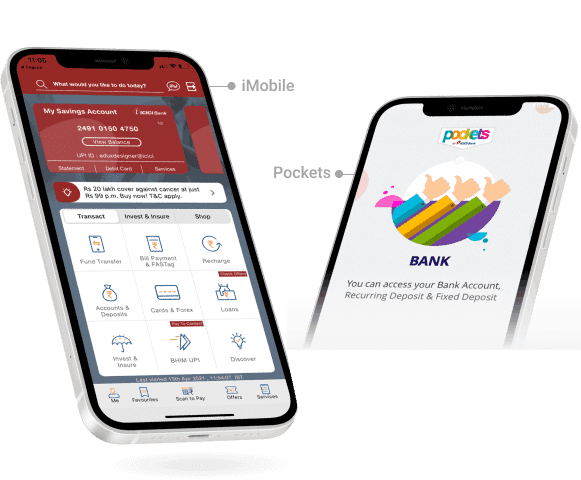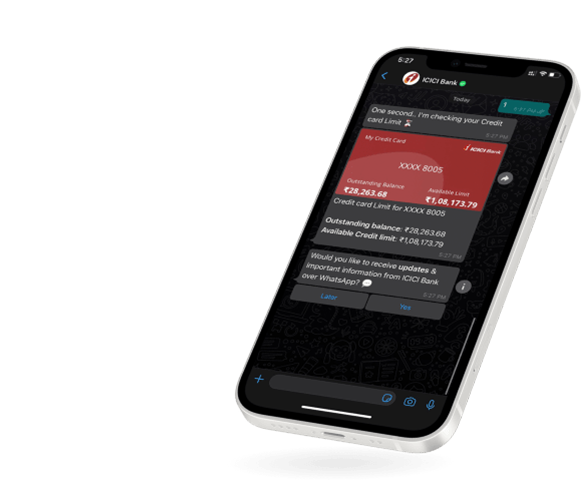Why Investing in Mutual Funds through ICICI Bank?


How to invest in
Mutual Funds?
Explore Our Mutual Fund Videos

Mutual Fund FAQs
Is Mutual Fund a good investment?


Mutual Funds are a good investment option for investors looking to diversify their portfolios. Instead of taking exposure to only one company or industry, a Mutual Fund investor invests in different securities and minimises your portfolio's risk.
How are returns earned in Mutual Funds?


Mutual Fund returns are calculated by computing appreciation in the value of your investments over a period as compared to the initial investment. The Net Asset Value of Mutual Fund indicates its price and is used in calculating returns for your Mutual Fund investments. Using a MF Calculator, you can easily calculate the returns on your mutual fund investment.
Are Mutual Funds taxable?


By investing in Mutual Funds, an investor can earn returns in the form of capital gains and dividend* income, which are taxable in the hands of the investor.
- A capital gain /loss arises when an investor sells any number of units of Mutual Funds
- An investor receives a dividend in proportion to the number of units held at the time of announcement of dividend, which gets distributed by companies to investors when they earn a surplus.
Tax on Capital Gains Received from Mutual Funds:
The capital gains depend on the period of holding (short term or long term) and the type of capital asset.
- In the case of Equity Mutual Funds, an investment tenure of less than 1 year (12 months) is a short-term investment. Any investment of over one year is a long-term investment
- Until March 31, 2023, in the case of Debt Mutual Funds, an investment tenure of up to 3 years (36 months) is a short-term investment and any investment of over 3years is considered as long-term. However, from April 01, 2023, capital gains from Debt Mutual Funds purchased on or after April 01, 2023 (i.e. a fund which invests up to 35% of its proceeds in the equity shares of domestic companies) are to be considered as short-term capital gains irrespective of the period of holding.
Fund Type |
Short-term capital gains |
Long-term capital gains |
Equity Funds |
15% cess + surcharge |
Any gain above Rs 1,00,000 in a financial year is taxable 10% + cess + surcharge |
Hybrid Equity-oriented Funds |
||
Debt Funds (Purchased before April 01, 2023) |
Taxed at the investor’s income tax slab rate |
20% with indexation + cess + surcharge |
Hybrid Debt-oriented Funds (Purchased before April 01, 2023) |
||
Debt Funds (Purchased on or after April 01, 2023) |
Taxed at the investor’s income tax slab rate |
NA |
Hybrid Debt-oriented Funds (Purchased on or after April 01, 2023) |
Equity funds/Equity oriented funds STT should be paid at the time of sale. In case it is not paid, short term capital gains are taxable at slab rate and long term capital gains are taxable at 20% plus surcharge and cess.
Tax on Dividend* Income received from Mutual Funds:
- From April 1, 2020, Mutual Fund dividends are taxable in the hands of investors. The dividend income is taxable under the head “income from other sources” at the applicable income tax slab rate for the financial year
- In addition to such a taxation, the distributor of dividend* income must deduct TDS (tax deducted at source) at a rate of 10%. However, TDS will not be deducted if the total dividend paid by the distributor during the financial year is less than Rs 5,000
- If the investor fails to provide the PAN to the distributor ,TDS will be deducted at a rate of 20%
- For Non-Resident Individuals, TDS is required to be deducted at the rate of 20% subject to the Double Taxation Avoidance Agreement (DTAA), if any.
*As per the Securities and Exchange Board of India’s (SEBI) circular, ‘Dividend Plan’ is renamed as ‘Income Distribution cum Capital Withdrawal Plan’ or ‘IDCW Plans’ with effect from April 1, 2021 .
Disclaimer
Terms and Conditions of ICICI Bank, as available on www.icicibank.com and Terms and Conditions of the third parties apply. ICICI Bank is not responsible for third party products, goods, services and offers. Customers shall be deemed to have read, understood and consented to these Terms and Conditions.
Nothing in this document is intended to constitute advice of any kind including legal, tax, security or investment advice or opinion regarding the appropriateness of any investment(s) or an offer, invitation or solicitation for any product(s) or service(s) and does not intend to create any rights or obligations.
The use of any information set out herein is entirely at the recipient’s own risk. ICICI Bank does not accept any responsibility for any errors whether caused by negligence or otherwise or for any loss(es) or damage(s) incurred by anyone by placing reliance on anything set out in this document, including any loss(es) or shortfall(s) resulting from the operations of the Mutual Funds. The information set out herein may be subject to updation, completion, revision, verification and amendment.
For a "Fund of Funds" scheme, investors may please note that they will be bearing the recurring expenses of the relevant Fund of Funds Scheme in addition to the expenses of the underlying schemes in which the Fund of Funds Scheme makes investment.
ICICI Bank is acting merely as a distributor/corporate agent/point of service for the third party(ies). Any investment(s) in such third party product(s)/service(s) shall constitute a contract between the investor and the third party. ICICI Bank shall not be liable or responsible for any loss(es) resulting from the third party’s product(s). The contract, with regard to the Mutual Fund is between the asset management company and the investor and not between ICICI Bank and the investor. Participation by ICICI Bank’s customers is on a purely voluntary basis and there is no direct or indirect linkage between the provision(s) of the banking services offered by the Bank to its customers and their usage of the product(s) or participation in the scheme. Please visit www.icicibank.com/Personal-Banking/investments/mutual-funds/disclosure page for more details.
Invest in Mutual Fund,
Anywhere Anytime
- Mobile Banking
- Net Banking
- WhatsApp Banking





Invest in Mutual Fund,
Anywhere Anytime
Mobile Banking | Net Banking
WhatsApp Banking





























